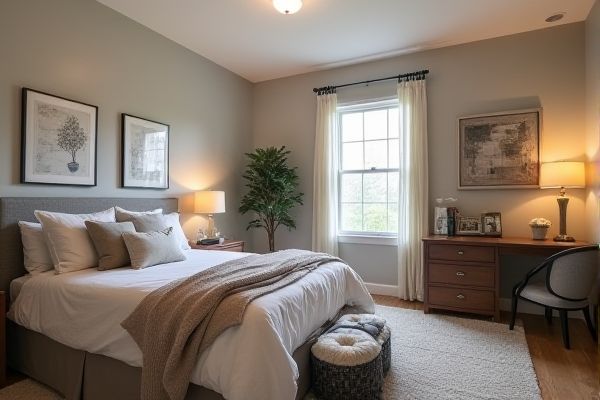
Transforming your basement into a home office maximizes productivity with a quiet, dedicated workspace, while converting it into a guest room offers comfort and privacy for visitors. Explore the rest of this article to discover which option best suits your lifestyle and enhances your home's functionality.
Table of Comparison
| Feature | Home Office | Guest Room Basement |
|---|---|---|
| Primary Use | Work and productivity | Accommodation for guests |
| Location | Usually main living area or quiet room | Basement level, separate from main living areas |
| Lighting | Natural and task lighting for focus | Ambient, often limited natural light |
| Furniture | Desk, chair, storage shelves | Bed, nightstand, storage furniture |
| Privacy | Moderate to high, depends on layout | High privacy, ideal for guests |
| Ventilation and Comfort | Standard HVAC or portable units | Potentially limited ventilation, may require extra climate control |
| Noise Level | Low noise preferred for concentration | Isolated, quieter environment |
| Technology Setup | Computers, internet, printers | Basic electrical outlets, may include entertainment devices |
| Design Flexibility | Customizable for productivity and ergonomics | Focused on comfort and hospitality |
| Value Addition | Increases home productivity and functionality | Enhances guest experience and home versatility |
Introduction: Choosing Between a Home Office and a Guest Room in the Basement
Transforming your basement into a functional space requires weighing the benefits of a home office against a guest room, depending on your lifestyle and space needs. A home office enhances productivity with quiet, dedicated work zones, while a guest room provides comfort and privacy for visitors. Your decision should align with how often you need workspace versus accommodation to maximize the basement's value.
Space Optimization: Maximizing Your Basement's Potential
Transforming a basement into a home office or guest room requires strategic space optimization to maximize functionality and comfort. Utilize multi-purpose furniture like fold-out desks or Murphy beds to save floor space while maintaining versatility. Incorporate built-in storage solutions and adequate lighting to enhance usability, ensuring your basement meets both work and hospitality needs efficiently.
Privacy and Noise Considerations
A basement guest room offers enhanced privacy and reduced noise interference compared to a home office, making it ideal for visitors seeking a quiet retreat. Your home office may experience more frequent disturbances due to household activities, impacting concentration and productivity. Designing the basement space with soundproofing materials can further improve noise insulation for an optimal guest experience.
Lighting and Ventilation Needs
A home office requires ample natural light and adjustable artificial lighting to reduce eye strain and maintain productivity throughout the day, while a guest room basement benefits from softer, ambient lighting to create a relaxing atmosphere. Proper ventilation in a home office is crucial to ensure fresh air circulation and prevent stuffiness, enhancing focus and comfort during work hours. Your guest room basement should have sufficient ventilation options such as windows or mechanical systems to control humidity and improve air quality, creating a welcoming space for guests.
Design Aesthetics: Creating a Comfortable Environment
Designing your basement as a home office requires careful attention to lighting, color schemes, and ergonomic furniture to foster productivity and comfort. In contrast, transforming the space into a guest room emphasizes cozy bedding, ambient lighting, and warm decor to create a welcoming atmosphere for visitors. Balancing functionality with style ensures the basement environment meets your specific lifestyle needs while maintaining aesthetic appeal.
Storage Solutions for Dual-Purpose Basements
Maximize your basement's functionality by integrating custom storage solutions tailored to both home office and guest room needs. Utilize built-in shelving, under-bed drawers, and multi-functional furniture to keep work essentials organized while providing ample space for guest belongings. Efficient storage systems help maintain a clutter-free environment, enhancing comfort and productivity in dual-purpose basements.
Budget and Renovation Costs Comparison
Home office renovations typically require investments in ergonomic furniture, proper lighting, electrical upgrades, and soundproofing, with costs averaging between $5,000 and $15,000 depending on quality and space. Basement guest room conversions often involve more extensive structural work such as moisture control, insulation, drywall, flooring, and possibly installing a bathroom, driving expenses up to $20,000 or more. Budget considerations favor home offices for lower costs and quicker completion, while basement guest rooms demand higher renovation budgets due to complex construction and finishing needs.
Functionality and Daily Use Cases
A home office basement offers a quiet, dedicated workspace with ample room for office equipment, making it ideal for focused productivity, virtual meetings, and storage of work-related materials. A guest room basement prioritizes comfort and privacy, providing a cozy retreat for visitors with essential amenities like a bed, seating, and often an attached bathroom. The functionality of a home office revolves around ergonomic design and efficient use of space during typical work hours, while a guest room emphasizes relaxation and hospitality for occasional use.
Home Value Impact: Office vs. Guest Suite
Converting a basement into a guest suite typically adds more value to a home compared to a home office due to increased living space and rental potential, appealing to buyers seeking flexibility and additional accommodations. Real estate data shows that homes with finished basement bedrooms or full suites often see a higher return on investment, especially in family-oriented neighborhoods. While a home office enhances appeal for remote workers, it usually does not contribute as significantly to overall home value as a fully functional guest suite.
Final Decision: Factors to Consider for Your Basement
When deciding between a home office and a guest room for your basement, consider factors like space utilization, privacy, and daily needs. A home office requires adequate lighting, soundproofing, and ergonomic furniture to enhance productivity, while a guest room prioritizes comfort, accessibility, and privacy for visitors. Evaluate your lifestyle priorities and the frequency of use to make the best choice for your basement's final purpose.
 homyna.com
homyna.com